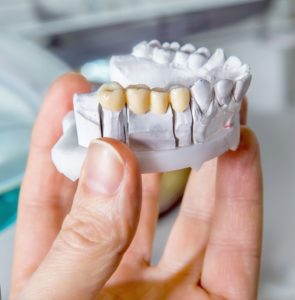
A dental bridge is a valuable form of tooth replacement. It can close that embarrassing gap in your smile, prevent your remaining natural teeth from drifting out of place, and enhance your chewing ability. Still, before you commit to receiving a dental bridge in Branford, you may want to know how long this type of restorative treatment typically lasts. In this article, we will discuss the expected lifespan of a dental bridge and how you can help your bridge to stand the test of time.
The Life Expectancy of Bridges
Dental bridges can have widely varying life expectancies. Some experts say that a dental bridge may last for just 5 – 7 years. However, others offer a different opinion and say that a bridge can easily last for 10 – 15 years. With proper care, it is even possible that a bridge could last a lifetime.
Different factors influence how long a bridge is expected to last. For example, metal bridges may last indefinitely. However, metal bridges are becoming less and less popular due to their unattractive appearance. Porcelain bridges may not last as long, but many patients believe that their outstanding aesthetics make them a worthwhile investment.
Extending the Lifespan of Your Bridge
Proper oral hygiene is key in making sure your bridge endures through the years. Thoroughly brushing and flossing will prevent harmful bacteria from sneaking beneath your bridge and attacking the teeth that support it (the abutment teeth). You should also use a floss threader or water flosser to clean the narrow space beneath your artificial tooth.
Some other steps you can take to protect your bridge include:
- Be choosy about what you eat. Bridges are durable and can stand up to virtually any food. However, eating a lot of hard foods is dangerous because they put a bridge under a lot of pressure and may cause it to break or crack. Try to avoid biting down on things like ice, jawbreaker candies, and bones.
- Watch out for signs of teeth grinding. Continually grinding or clenching your teeth can strain your bridge and compromise its structural integrity over time. Teeth grinding often happens at night, so if you frequently wake up with a sore jaw, you should visit your dentist to ask about getting a nightguard to protect both your natural teeth and your bridge.
- Visit your dentist regularly. Your dentist will examine your bridge at each checkup and let you know if it is in need of repair or replacement.
A dental bridge’s lifespan can stretch for many years if you take a few simple steps to protect it. Your dentist would be happy to answer any further questions you may have about this reliable tooth replacement solution.
Meet the Author
Dr. Dean Cloutier is the general dentist at New Haven Dental Group in Branford. He is a Master of the Academy of General Dentistry and a Fellow of both the American College of Dentists and the International College of Dentists. Dental bridges are among the many restorative services that he is qualified to offer. To learn more about Dr. Cloutier and how our team can help you replace missing teeth, contact us at 203-488-0091.
